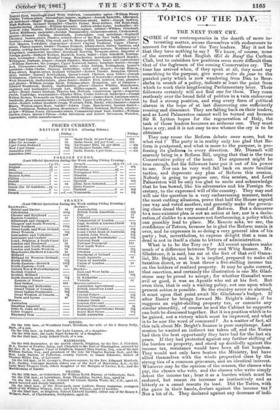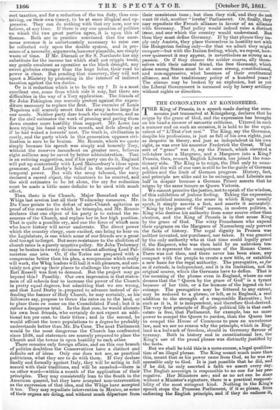TOPICS OF THE DAY.
THE NEXT TORY CRY.
SOME of our contemporaries in the dearth of more in- teresting matter, amuse themselves with endeavours to account for the silence of the Tory leaders. May it not be that they have nothing to say ? We know, of course, none of the secrets of that English Eil de iceuf the Carlton Club, but to outsiders few positions seem more difficult than that of the fuglemen of the coming Conservative cry. The time has arrived when, if they speak at all, they must say something to the purpose, give some ordre du jour to the puzzled party which is now wandering from Dan to Beer- sheba in search of a policy, indicate at least the point from which to work their lengthening Parliamentary lever. Their followers certainly will not find one for them. They roam restlessly over the broad field of politics in a vain endeavour to find a strong position, and ring every form of political alarum in the hope of at last discovering one sufficiently rousing and dissonant. They are falling back on their leaders, and as Lord Palmerston cannot well be turned out because Sir B. Lytton hopes for the regeneration of Italy, the task of those leaders becomes an arduous one. They must have a cry, and it is not easy to see whence the cry is to be obtained.
They may rouse the Reform debate once more, but to what end ? The party is in reality only too glad that Re- form is postponed, and what is more to the purpose, is pro- fessing its gladness in every direction. Mr. Disraeli will scarcely bring in a Reform Bill, urging that that is the true Conservative policy of the hour. The argument might be true enough, but his followers have put it out of his power to use. Nor can he very well fall back on more familiar tactics, and deprecate any plan of Reform this session. Nobody is going to propose one, this session, and Lord Palmerston will be only too glad to smile and acknowledge that he has bowed, like his adversaries and his Foreign Se- cretary, to the expressed will of the country. They may and will use the question in a very embarrassing manner, make the most cutting allusions, prove that half the House argued one way and voted another, and generally make the govern- ing class dread the very sound of Reform. But a demurrer to a non-existent plea is not an action at law, nor is a decla- ration,of dislike to a measure not forthcoming, a policy which can possibly lead to place. Mr. Rennie asks, we see, the confidence of Totnes, because he is glad the Reform mania is over, and he expresses in so doing a very general idea of his party ; but, nevertheless, to express delight that a man is dead is not in itself a claim to letters of administration.
What is to be the Tory cry ? All recent speakers make much of a difference between Tory and Whig finance. Mr. Gladstone, it is said, has sat at the feet of that evil Gama- liel, Mr. Bright, and is, it is implied, prepared to make all taxation direct, or at least throw a five-shilling income tax on the holders of realized property. It may be quite correct, that assertion, and certainly the illustration is one Mr. Glad- stone may be proud to accept ; for whether Gamaliel were evil or good, it was an Apostle who sat at his feet. But even then, that is only a waiting policy, not one upon which present action is possible. Be the country never so alarmed, it must upon that point await Mr. Gladstone's budget. If after Easter he brings forward Mr. Bright's ideas ; if he suggests an eight-shilling property tax, or commits any similar absurdity, of course he and the Cabinet he supports can both be dismissed together. But it is a position which is to be gained, not a victory which must be improved, and what is to be now the word of command ? As a matter of fact, all this talk about Mr. Bright's finance is pure surplusage. Last session he wanted an indirect tax taken off, and the Tories had then the best opportunity they have bad for the last six years. If they had protested against any further shifting of the burden on property, and stood up decidedly against the income tax, resistance would have been all but hopeless. They would not only have beaten the Ministry, but have allied themselves with the whole propertied class by the strong ties of a common grievance, and an identical interest. Whatever may be the opinion of the masses, the classes who pay, the classes who vote, and the classes who write simply detest the income tax ; bear it as a burden which must be endured, but resent its increase as instinctively and as bitterly as a camel resents its load. Did the Tories, with the game in their hands, declare against the income tai Not a bit of it. They declared against any decrease of indi- rect taxation, and for a reduction of the tea duty, thus con- triving, on their own theory, to be et once illogical and op- pressive. They can do nothing with that cry now, nor we believe, at any time. If there is any one question of politics on which the two great parties agree, it is upon this of finance. Both are in practice convinced that the enor- mous revenue it is unfortunately necessary to raise can be collected only upon the double system, and in pre- sence of a necessity, arguments, however plausible, are simply waste of time. If Mr. Disraeli or Sir S. Northcote has any substitute for the income tax which shall not cripple trade, any gentle emulcent as operative as the black draught, any sweet globules stronger than the huge bolus, their road to power is clear. But pending that discovery, they will not upset a Ministry by protesting in the interest' of indirect taxation against the tea duties. Or is it reduction which is to be the cry ? It is a most excellent one, come from which side it may, but there are difficulties in the way of a Tory application. The friends of Sir John Pakington can scarcely protest against the expen- diture necessary to replace the fleet. The enemies of Louis Napoleon will scarcely assert that the army is too large for our needs. Neither party dare touch the volunteers, and as for the civil estimates the work of pruning and paring them down creates more hostility than support. Mr. Lowe has been trying his hand only this month, and feels already as if he had waked a hornets' nest. The truth is, civilization is costly, and the party which in this generation opposes civi- lization is sure to be beaten. Mr. Rennie whom we quote simply because his speech was simply and honestly Tory, without the reserves incumbent on greater men, believes eight millions may be saved by better adMinistration. That is an enticing suggestion, and if his party can do it, England will put up contentedly with Lprd Malmesbury's ideas upon grammar, and Lord Derby's belief in the necessity of the temporal power. But with the army tabooed, the navy declared a sacred object, the volunteers to be courted, and the civil estimates to be Jet alone, the cry for reduction must be made a little more definite to be used with much effect.
Then there is the Church. Major Beresford says the Whigs last session lost all their Wednesday measures. Mr. Du Cane points to the defeat of anti-Church agitation as proof of the reaction in which he triumphs, and Mr. Rennie declares that one object of his party is to extend the re- sources of the Church, and replace her in her high position. That is quite a possible cry, and one the force of which men who know history will never underrate. The direct power which the country clergy, once excited, can bring to bear on the Legislature, is one which some of our friends are a great deal too apt to forget. But mere resistance to the abolition of church rates is a purely negative policy. Sir John Trelawney may be beaten in twenty divisions without affecting Lord Pal- merston one iota. Or, if the Tories are prepared with a compromise better than his plan, a compromise which really will work, the Whig leaders will hail it with pleasure, and cer- tainly not give up their places to challenge the very solution Earl Russell was first to demand But the project may go beyond this ? Possibly. Our own impression is that states- men of all schools fear to increase the power of the Church in pretty equal degrees, but admitting that we are wrong, and that Lord Derby is . prepared to advance instead of de- fending the banner of Holy Church, he may certainly, as his followers say, propose to throw the rates on to the land, or to place them en masse on the Consolidated Fund ; but it is rather a dangerous trial. In the first case, he would alienate his own best friends, who certainly do not expect an addi- tional ten per cent. to their tithes ; and in the second, he would affront the town populations to a degree he probably understands better than Mr. Du Cane. The next Parliament would be the most dangerous the Church has confronted since 1538, and statesmen are scarcely prepared to place the Church and the towns in open hostility to each other. There remains only foreign affairs, and on this one branch of politics doubtless the Conservatives have a distinct and definite set of ideas. Only one does not see, as practical politicians, what they are to do with them. If they declare finally and formally against Italy, they will be acting in full accord with their traditions, and will be smashed—there is no other word—within a month of the application of their principles. They may consistently lean to the South in the American quarrel, but they have accepted non-intervention as the expression of that idea, and the Whigs have accepted it too. They may repudiate intervention in Mexico, as some of their organs are doing, and without much departure from their consistent tone ; but then they risk, and they do not want to risk, another " lorcha" Parliament. Or, finslly, they may repudiate the French alliance in favour of an alliance with Germany. That policy would indeed raise a distinct issue, and one which the country would understand. But then they must define Germany. If by that phrase they im- ply only Austria, they place themselves in hostility not with the Hungarian feeling only—for that we admit they might conquer—but with the Italian feeling, which, we repeat, how- ever quiescent it may appear, is nevertheless as strong as a passion. Or if they choose the nobler course, ally them- selves with their natural friend, the free Germany, which alone among States must be at once strong, constitutional, and non-aggressive, what becomes of their continental alliance, and the traditionary policy of a hundred years ? The silence may be broken by an explosion, but as yet the Liberal Government is menaced only by heavy artillery without sights or direction.































 Previous page
Previous page